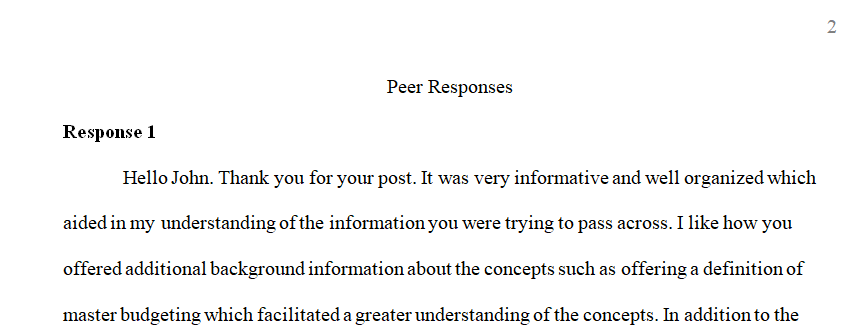Discuss the benefits of using a master budget and benchmarking
Assignment Details: I need help with a response of 100 words to each response to 4 peers discussion posts.
Peer #1- John,
Discuss the benefits of using a master budget and benchmarking.
Master budgeting is a complete picture of a businesses finances. It includes every part of a businesses process, from raw materials to net revenue. It is a set of completed budgets for the individual processes of a business, including operational, static and capital expenditure budgets. It also includes goals and timelines to meet those goals. These goals can also be used as benchmarks- a way to compare actual performance versus expected performance of a particular business tactic or process. By evaluating the benchmarks, a business can often improve performance.
Explain the role of employee behavior on budget development, budgetary slack, and the importance of participative budgeting.
The example our book provides is a salesman soft-padding the expected sales budget for his next financial period. In the scenario, he knows the benchmark set for him is too low and he will easily exceed the goal, potentially earning him a bonus. Unfortunately for the business, this sets them up for a potential failure, whether by not being able to produce the units he knows will be ordered or the sale falling through some other way. However, if he had participated in the budgeting process, he could have told the purchaser confidently that they would be able to produce the widgets because the business would know to have ordered enough materials.
Describe one concept from this week’s learning that will help you in managing your own personal budget.
I think the concept that will help me the most in my personal finances will be the static budget. In a static budget, a budget is “prepared for only one sales volume” (Miller-Nobles & Mattison, 2020). In my weekly/monthly/annual budget, I can use my hourly wages as a “sales volume” and compute the estimated earnings for each financial period: 40 hours a week, 160 hours a month and 2,080 hours a year. I can roughly estimate the taxes garnished at about 33%. If I use past bills and known fixed costs (like the mortgage & property taxes) I can craft a static budget for my house. Any variable earnings I have (like over time pay) can go towards savings or other projects.
Tracie Miller-Nobles & Brenda Mattison, Pearson eText for Horngren’s Managerial Accounting: The Managerial Chapters, 7e. Copyright 2020, Pearson Education Inc.
Peer #2-Jose,
Greetings class!
A budget is a financial tool managers use to plan and coordinate the actions of a company aiming for a set goal. The first step to budgeting is setting a goal: reduce costs, expand the business, or become an industry leader in any business aspect. The second step to budgeting is to direct the company on the actions necessary to accomplish those goals. Miller-Nobles/Mattison. (2020).
A master budget includes operating and financial budgets to plan, direct, control, and develop strategies to achieve a company’s goals. At the same time, a budget provides a coordination and communication channel between managers from multiple levels and departments to work together to achieve the company’s goals. Once a period finishes, companies benchmark their results against previous budget results to measure their progress and highlight areas needing more attention and improvement by comparing the budgeted versus the actual numbers. Miller-Nobles/Mattison. (2020).
A participative budget integrates multiple business managers into creating, planning, and executing the period’s budget. A motivated workforce must develop the period’s budget to avoid the intentional over-stating or understating of revenues and expenses, known as budgetary slack, to make their department numbers look better at the end of the period.
I plan to implement a concept in my personal life budgeting: developing strategic (long-term) and operating (short-term) budgets to address more extensive plans, like buying an investment property, and small projects, like paying off my credit card debts.
References:
Miller-Nobles/Mattison. (2020). Horngren’s accounting: The managerial chapters (7th ed.). Pearson.
Peer #3-Devin,
Hello All,
Explain when you would use a flexible budget.
A flexible budget is one that is established for many different levels of sales volume (Miller-Nobles & Mattison, 2020, p. 7-6). Flexible budgets help paint the picture of how much money will need to be allocated to each team based on the needs or output of each team. For example, a software company might allocate a budget of 100K towards that inbound call center based on how many calls generally come into the center and how many representatives they need to answer all the calls in a timely manner. The support team also requires each person to have a set amount of equipment such as laptops or headsets to operate for their intended purposes. At the same company, a budget of 20K may be invested in their social media department as it may require less staff to maintain the company’s social media presence than it does for any customer support calls.
Answer preview to Discuss the benefits of using a master budget and benchmarking

APA
617 words


